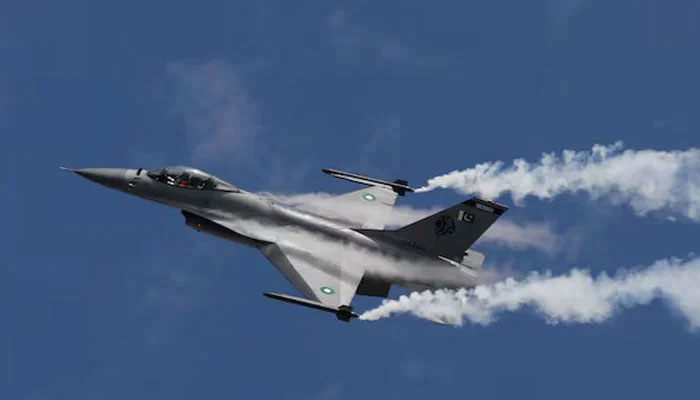A defining moment
Propaganda gave way to exposed falsehoods, and arrogance crumbled under shame
Today, we witness a defining moment in South Asian history, a major geopolitical turning point redefining the blurred equation of power and respect. The days to come will unfold the secrets behind New Delhi’s grand miscalculations and nefarious objectives; however, what is established beyond any doubt is that in the skies of South Asia, there is no sovereignty without the will of Islamabad.
With renewed belief in our hearts, we need to reflect on the recent conflict – not just emotionally, but with pragmatic retrospection, so we may move forward with valuable lessons. While Pakistan’s achievements on the geopolitical, diplomatic and military fronts are many and will be discussed in detail in the days to come, one point must be made clear: Operation Bunyanum Marsoos was a resolute response to Indian arrogance, built on deceitful narratives, hollow bravado, and misplaced confidence.
As Pakistan responded at every stage of India’s escalatory campaign, myths of military superiority and magnanimity collapsed. Propaganda gave way to exposed falsehoods, and arrogance crumbled under shame. The Pakistan armed forces delivered a decisive blow, neutralising over half a dozen Indian fighter aircraft in their own airspace, breaching their much-touted S-400 defence shield, striking command-and-control centres, airfields and critical military infrastructure across the entire front – from the Himalayas to the Arabian Sea. These actions have left deep scars on the narrative of Hindutva-fueled jingoism.
This brief account is a tribute to the architects of Pakistan’s resolute defence, particularly the Pakistan Air Force, whose role was central and decisive. Without the PAF’s preparedness and execution, the outcome might have been drastically different. At the heart of this success stands Air Chief Marshal Zaheer Ahmad Babar. A leader of vision, resolve, and professionalism, he foresaw the looming threat soon after assuming command. As early as 2021, he outlined a roadmap for capability enhancement and indigenisation, which proved crucial in the past two weeks. Despite financial constraints, he optimised resources, upgraded structures and fast-tracked the deployment of advanced technologies.
When the moment arrived, he led from the front – commanding Operation Zarb-e-Karrar, the PAF’s codename for its role in Bunyanum Marsoos. Under his leadership, Pakistan’s airpower delivered a powerful message: arrogance, no matter how loudly trumpeted, cannot withstand precision, preparation and patriotism.
In this short war, which will be remembered for a long time in history, the display of strong will, national resolve, and tri-services harmony was witnessed at an unprecedented level, and to this end, credit goes to COAS Gen Asim Munir. A true patriot and visionary leader, he has been an equal partner in the capability development for the tri-services, and especially the PAF, over the past years.
In these testing times, through his unflinching belief and valour, he enabled the walk on the tightrope of tough decisions, uniting the national leadership, the nation, and the three services into Bunyanum Marsoos to defeat the enemy. His leadership role throughout the narrated journey has always remained remarkable, though some might not fully or partially understand it.
Let’s thank Allah Almighty for the countless blessings in the shape of this astounding victory and pledge to redefine our path for the future. We are a proud nation pursuing peaceful coexistence with all our neighbours, but we are ready and armed to thwart any threat to our honour and sovereignty.
It must be realised that the tough journey has not ended yet, nor have our enemies backed out for long; this moment is a strategic pause, maybe long or short.
The writer is a former resident editor of the Frontier Post.
-
 ChatGPT Caricature Prompts Are Going Viral. Here’s List You Must Try
ChatGPT Caricature Prompts Are Going Viral. Here’s List You Must Try -
 James Pearce Jr. Arrested In Florida After Alleged Domestic Dispute, Falcons Respond
James Pearce Jr. Arrested In Florida After Alleged Domestic Dispute, Falcons Respond -
 Cavaliers Vs Kings: James Harden Shines Late In Cleveland Debut Win
Cavaliers Vs Kings: James Harden Shines Late In Cleveland Debut Win -
 2026 Winter Olympics Snowboarding: Su Yiming Wins Bronze And Completes Medal Set
2026 Winter Olympics Snowboarding: Su Yiming Wins Bronze And Completes Medal Set -
 Trump Hosts Honduran President Nasry Asfura At Mar-a-Lago To Discuss Trade, Security
Trump Hosts Honduran President Nasry Asfura At Mar-a-Lago To Discuss Trade, Security -
 Cuba-Canada Travel Advisory Raises Concerns As Visitor Numbers Decline
Cuba-Canada Travel Advisory Raises Concerns As Visitor Numbers Decline -
 Anthropic Buys 'Super Bowl' Ads To Slam OpenAI’s ChatGPT Ad Strategy
Anthropic Buys 'Super Bowl' Ads To Slam OpenAI’s ChatGPT Ad Strategy -
 Prevent Cancer With These Simple Lifestyle Changes
Prevent Cancer With These Simple Lifestyle Changes -
 Air Canada Flight Diverted St John's With 368 Passengers After Onboard Incident
Air Canada Flight Diverted St John's With 368 Passengers After Onboard Incident -
 Experts Reveal Keto Diet As Key To Treating Depression
Experts Reveal Keto Diet As Key To Treating Depression -
 Inter Miami Vs Barcelona SC Recap As Messi Shines With Goal And Assist
Inter Miami Vs Barcelona SC Recap As Messi Shines With Goal And Assist -
 David Beckham Pays Tribute To Estranged Son Brooklyn Amid Ongoing Family Rift
David Beckham Pays Tribute To Estranged Son Brooklyn Amid Ongoing Family Rift -
 Jailton Almeida Speaks Out After UFC Controversy And Short Notice Fight Booking
Jailton Almeida Speaks Out After UFC Controversy And Short Notice Fight Booking -
 Extreme Cold Warning Issued As Blizzard Hits Southern Ontario Including Toronto
Extreme Cold Warning Issued As Blizzard Hits Southern Ontario Including Toronto -
 Lana Del Rey Announces New Single Co-written With Husband Jeremy Dufrene
Lana Del Rey Announces New Single Co-written With Husband Jeremy Dufrene -
 Ukraine-Russia Talks Heat Up As Zelenskyy Warns Of US Pressure Before Elections
Ukraine-Russia Talks Heat Up As Zelenskyy Warns Of US Pressure Before Elections




